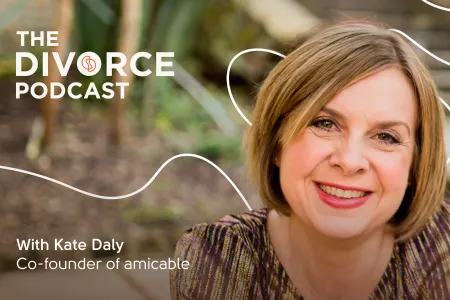How to prepare for a divorce
If you and your partner have decided to separate, the prospect of divorce can feel overwhelming. For advice on the early stages, read our guide on how to separate amicably. It explores the emotional journey and gives a helpful overview of the legal process.
At amicable, we know that deciding to divorce is often painful and challenging, and there are many factors to consider. To make the process simpler, we’ve compiled a checklist below to help you prepare for the legal and emotional journey so that you can equip yourself with knowledge and get organised.
Note: If you’re ending a civil partnership, you will need to go through the dissolution process which is the same as the divorce process.
The legal process:
1. Are you and your ex-partner in agreement?
- If you’re not in agreement or if you rush your ex-partner, you risk knee-jerk reactions in return.
- If you’re the instigator, be patient, allow your ex-partner time and space or explore professional support from a Divorce Specialist, a therapist or a counsellor if one of you gets stuck.
- Not agreeing may slow the divorce process and make negotiating how to divide money and property amicably, difficult.
- If you haven’t spoken to your ex-partner about separating, read our guide here.
2. Would you benefit from joint advice before you begin?
Are there any areas you would like to discuss or where you would benefit from clarification before getting started? This can include topics such as what options are available around dividing the family home, goal setting to stay on track or which other professionals you need to bring into the process and when.
You can receive joint advice from a Divorce Specialist to help you with any of your questions before getting started. Book your Joint Advice consultation here.
3. Have you gathered the necessary documents?
In order to submit your divorce application to the court, there are several documents you may need to have access to including your marriage certificate and deed poll documents (if you have changed your name). You will also need a translation for your marriage certificate if you were married abroad.
4. Have you decided to do a joint or sole application?
Deciding whether to submit a joint or sole application is down to personal preference. If you’re an amicable customer, it’s likely this will be a joint application. If you’re submitting a joint application, remember you’ll both need to check this at each stage of the divorce process.
Dividing your money and property:
When you divorce, most will choose to divide their money, property and other assets or debts at the time of separation. Remember, in order to make your financial arrangements legally binding and to legalise your financial split to end future claims, you will need a financial order (called a consent order, if you agree).
5. How you discussed how you'll divide your money and property, or do you need help?
If you haven’t already, how do you plan on discussing how to divide your money and property? If you do it without professional help, it’s called a kitchen table agreement. To formalise this agreement, you will need a legally drafted consent order, stamped by a judge to make it legally binding. This is optional but recommended, because divorce doesn’t end your financial relationship. You can check if your agreement is fair using our agreement checker.
If you need help with this, amicable offer negotiation services. Over 95% of our customer reach an agreement over how to divide their money and property. We also prepare the necessary legal documents and manage the court process.
6. Have you thought about timescales?
Divorces take a minimum of seven months to be completed, and longer if you’re dividing your finances as part of your divorce.
If you would like to arrange your finances and legalise your split through a consent order, you must wait 30 weeks after the courts have started your divorce. You aren’t able to submit your draft consent order until you’ve reached the conditional order stage of the divorce process. You can request a custom timeline here, to understand when you’ll be able to apply for your consent order.
7. Have you started gathering the financial information required for your consent order?
In order to know how you’ll divide any money and property, you need to know what you have. It’s important to have up-to-date information on the value of your property and other financial information. Most people don’t realise that even if they’re not sharing pensions as part of the divorce, they will still need to get their CETV for any pensions.
Parenting apart:
- Have you discussed when you will tell your child(ren) if you haven’t told them already?
- Have you made a parenting plan to document your agreed arrangements for your children, or do you need help?
- Have you told the school about your separation?
- Explore the amicable co-parenting app, parenting apart blogs and podcast episodes.
The emotional journey:
- Where are you on the healing curve and are you coping?
- How well are you adjusting to the lifestyle?
- Have you listened to The Divorce Podcast?
- Share our friends and family guide for separation, so that your friends and relatives can support you in a kinder and better way
FAQs
What is the first step when you want a divorce?
The first step of getting divorced is completing the online divorce application and submitting it through the government website. You may benefit from getting joint advice before starting the legal process.
How much does getting divorced cost?
You can get divorced through the government website for the £612 government court fee. This is an administrative fee to process your divorce application. If you want to legalise your financial split you will need a consent order if you’re in agreement which varies in cost.
Do we have to agree to divorce?
If one person decides the marriage is over, then it is. There are limited ways to contest a divorce in England and Wales. However, if you’re not in agreement: it can slow down the process; it can make negotiating a financial settlement more difficult; it can also damage your ability to parent apart. Being amicable will save you time and money.
Read More

The new no-fault system has a mandatory built-in ‘reflection period' which has been designed to help couples to adjust to the news their marriage or civil partnership is over and to make any child or financial arrangements...

Use amicable's divorce diagnostic tool for help deciding what route is best for you as you navigate your divorce.

In this episode Kate was joined by financial planner, Louise Oliver and divorce coach, Tosh Brittan to discuss adjusting to a new lifestyle post-separation.

Start your amicable divorce journey
Speak to an amicable Divorce Specialist to understand your options and next steps for untying the knot, amicably.
Your guide to a kinder divorce
What if divorce didn’t have to be a battle?
In amicable divorce, Kate Daly offers compassionate, practical guidance to help you separate in a kinder, better way. Whether you’re just beginning, working through the practicalities or adjusting to co-parenting, this book meets you exactly where you are - and helps you move forward with confidence.
Pre-order on Amazon today
-5.webp)





Comments (0)